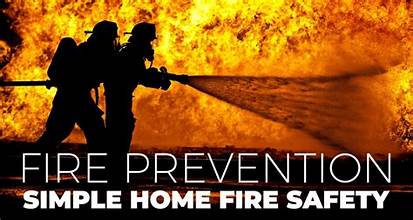
As a firefighter, I’ve seen firsthand the devastating effects a home fire can have on families and communities. Fire doesn’t discriminate, and it can spread quickly, leaving little time to react. But the good news is that many home fires are preventable. By taking a few proactive steps, you can significantly reduce the risk of fire in your home and protect the people you love.
The winter months and holiday season are particularly risky times for home fires. Increased use of heating devices, candles, and holiday decorations all contribute to the heightened danger. Let’s talk about some essential home fire safety tips that everyone should follow, with a special focus on staying safe during the colder months and festive celebrations.
Fire Safety Tips for Your Home
Prevent Fires During the Holidays and Winter Months
- Be cautious with space heaters: Keep them at least three feet away from anything flammable and never leave them running unattended.
- Inspect holiday lights and decorations: Check for frayed wires, broken bulbs, or other signs of wear, and avoid overloading electrical outlets.
- Water your Christmas tree regularly: A dry tree can catch fire quickly and burn rapidly. Dispose of it promptly after the holidays.
- Use fireplaces safely: Have your chimney inspected annually, use a screen to prevent sparks, and ensure the fire is completely out before leaving or going to bed.
- Limit the use of candles: Opt for flameless candles where possible, especially in households with children or pets.
Prevent Fires Before They Start
- Keep flammable materials away from heat sources: Items like curtains, bedding, and papers should be kept at least three feet away from space heaters, stoves, and fireplaces.
- Never leave cooking unattended: Kitchen fires are a leading cause of home fires. Stay in the kitchen while frying, grilling, or broiling food.
- Avoid overloading electrical outlets: Plugging too many devices into a single outlet can overheat and spark a fire.
- Practice safe smoking habits: If you smoke, do it outside, and use a deep, sturdy ashtray. Make sure cigarette butts are completely extinguished.
Equip Your Home with Fire Safety Tools
- Install smoke alarms: Place smoke alarms in every bedroom, outside each sleeping area, and on every level of your home. Test them monthly and replace the batteries twice a year.
- Have a fire extinguisher: Keep at least one multi-purpose fire extinguisher in your home, ideally in the kitchen. Learn how to use it with the PASS method: Pull, Aim, Squeeze, and Sweep.
- Consider a fire escape ladder: If you live in a multi-story home, keep a fire escape ladder in upstairs bedrooms for an emergency exit.
Create and Practice a Fire Escape Plan
- Plan two ways out of every room: Make sure windows and doors can be easily opened. Keep pathways clear of clutter.
- Designate a meeting spot: Choose a location outside your home where everyone can gather after escaping.
- Practice regularly: Conduct fire drills with your family at least twice a year, both during the day and at night.
Be Mindful During Special Occasions
- Use caution with candles: Never leave candles unattended, and consider using flameless candles instead.
- Holiday lights and decorations: Inspect light strings for frayed wires, and turn them off before going to bed or leaving the house.
- Fireworks safety: Leave fireworks to the professionals. If you must use them, follow local regulations and use them in open, outdoor areas away from structures.
Conclusion
Fire safety is everyone’s responsibility. By taking these simple steps, you’re not just protecting your home—you’re safeguarding your family’s future. Remember, preparation and prevention are the keys to staying safe. Take action today, because when it comes to fire, every second counts. Stay safe out there!
Additional Resources
For more information on home fire safety, check out these resources:
- National Fire Protection Association (NFPA): www.nfpa.org
- U.S. Fire Administration (USFA): www.usfa.fema.gov
- Red Cross Fire Safety Tips: www.redcross.org
- Ready.gov – Fire Safety: www.ready.gov
- Local Fire Department: Contact your local fire department for community-specific safety programs and resources.
